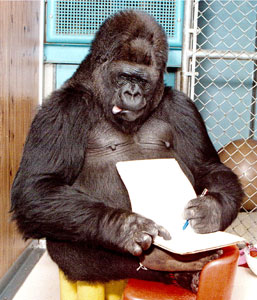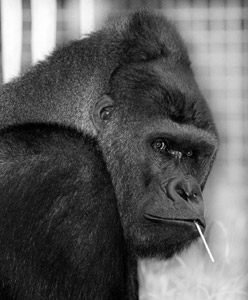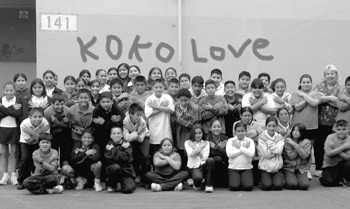Fine Animal Gorilla
Air Date: Week of November 15, 2002
A new music CD called "Fine Animal Gorilla" is based on the life of lowland gorilla Koko. She even contributed some of the lyrics using American sign language. Host Steve Curwood talks with Skip Haynes, one of the album's producers.
Transcript
CURWOOD: Southern California is famous for its reclusive celebrities with finicky tastes, but consider for a moment a star named Koko. Koko lives in northern California at the Gorilla Foundation and she’s the world-famous lowland gorilla who has learned to communicate with humans using American Sign Language.

Koko
(Photo: Ron Cohn/koko.org/The Gorilla Foundation)
Now there’s a new music CD based on Koko’s life and her experiences. Skip Haynes is one of the producers of the project. He explains how this unique collaboration among musicians and Koko and her caretakers came about.
HAYNES: We asked them to send us any materials they had relating to Koko and the other gorillas at the foundation. And because she understands English and she communicates through a variant of American Sign Language, they talk to her every day and she has opinions about everything and they write down transcripts of these conversations.
And we read the transcripts and we took certain phrases, for example, “Fine Animal Gorilla,” the name of the album, is Koko’s name for herself. And we took it from there. And all the lyrics on the album are taken from this material. It’s very specific to Koko. And when we play these songs for her, she recognizes this.
MUSIC: Koko, “Fine Animal Gorilla” FINE ANIMAL GORILLA (Laurel Canyon Animal Company, 2002):
From San Francisco to NYC
From coast to coast, from sea to sea
From here to the Congo, from Maine to Manila
I am a fine animal gorilla.
From coast to coast, from sea to sea
Everyone wants to sign with me.
I am a fine animal gorilla.
CURWOOD: There’s a bit of an African beat to this, I gotta say.
HAYNES: Yeah, it’s sort of a rap sort of beat. Although we stayed away from a lot of African stuff with Koko because she’s not African. She was born in San Francisco on the Fourth of July.
CURWOOD: That makes her as American a gorilla as you can be, huh?
HAYNES: You bet.
CURWOOD: Koko is credited as being a producer on this CD. What was her creative input?
HAYNES: Well, credited as being a producer, in one sense she actually is, because, for example, on “Fine Animal Gorilla” it was played for her, and there’s a line in it that I believe is a rhythmical answer. It wasn’t really lyrical content but it was a, “Do you think I’d lie?” And it was just an answering phrase. And when she heard it, she sang the word “shame,” so we took it out.
CURWOOD: [LAUGHS] She scolded you, huh?
HAYNES: Well, I wasn’t scolded, she just didn’t want to be represented as lying, you know, so she didn’t like that.
CURWOOD: Tell me how this works exactly. Does Koko have someone sign the lyrics to her?
HAYNES: She listens to the song.
CURWOOD: Yeah?
HAYNES: Oh yeah.
CURWOOD: And she understands the story, huh?
HAYNES: Absolutely. Totally sentient being. But she liked this song because her name is in it a lot. “Scary Alligator,” the second song, Koko has a scary alligator, it’s a plastic alligator, a toy alligator, and she kind of scares people with it and she calls it her scary alligator. And she liked the second version of that better because there was more stuff in it.
MUSIC: Koko, “Scary Alligator” FINE ANIMAL GORILLA (Laurel Canyon Animal Company, 2002):
Koko’s got a scary alligator that she calls her friend
She’s got a scary alligator and they play pretend
Be careful when you play with her she’ll scare you, too
She’s got a scary alligator, scary alligator…
CURWOOD: So “Scary Alligator,” how did Koko react to this song?
HAYNES: Well apparently she liked it a lot because the Foundation told us she picked up her scary alligator and plunked out a melody on her keyboard. It inspired her, I hope. I hope that’s what it meant. But we’re trying to get that. Now we’re trying to get the melody she wrote from the Foundation. I don’t know if they recorded it or not. Because if we can, we’re going to try to write a song around it. So Koko actually contributed a melody. It would be great. I mean, because our original intent was at some point to actually see if she’d like to play in a band.
CURWOOD: There’s a sad song on here called “Even Gorillas Get the Blues”. I understand this is about Koko’s companion, Michael, who died. Let’s take a listen to that now.
MUSIC: Koko, “Even Gorillas Get the Blues” FINE ANIMAL GORILLA (Laurel Canyon Animal Company, 2002):
Even gorillas get the blues
She had a friend, his name was Mike
They grew up together, everything seemed so right
He was her brother, she was his muse
Even gorillas get the blues…

Michael
(Photo: Ron Cohn/koko.org/The Gorilla Foundation)
HAYNES: I was talking about conversations with Koko. We also had conversations with Michael. And I was reading this, they described a conversation they had with him saying he woke up one morning screaming in extreme distress. They thought maybe he was being hurt by another gorilla.
And Michael also had about 500 words in American Sign Language-- not quite as much as Koko. But when they asked him what was wrong he told them-- because Michael came from the Cameroons. He was captured in the Cameroons when he was about three years old. And he told them he was having a nightmare about poachers killing his parents and capturing him, and I just, it just floored me.
And when we heard that, we realized if you can tell people things like this, it makes them look at the animal in an entirely different light and hopefully, you know, look at human beings in an entirely different light, also.
CURWOOD: What did your performers think of this Koko project? I mean, singing about a gorilla in a gorilla’s own words can’t exactly be a typical gig.
HAYNES: Well, you know, one of the great things about what we’re doing here is that normally when you’re doing a record, everybody, record companies and everyone, are concerned with if you have a sound that you maintain that sound and don’t spread out, and this just allows us to do whatever we want and it’s really fun.
I mean, there were literally almost 40 people involved in creating this album. Because one of the things that happened was Kelly Sullivan, who just sang “Fine Animal Gorilla,” her mother, Julie, teaches at a middle school, at Nimitz Middle School in Huntington Park, California. And she took the Koko album, the idea of Koko, to her class and her class just totally embraced it to the point where they made books for Koko and they went online and they attained a global awareness in about a week of all the horrible things that are happening in Africa about the gorillas and so forth.
And they got so into it, we asked the kids if they would write a song for the album, and they did. They wrote “Koko and the Nimitz Kids”. And then we asked them if they would like to sing the song, and 21 kids showed up.

The Kids from Nimitz Middle School
(Photo: Ron Cohn/koko.org/The Gorilla Foundation)
MUSIC: Koko, “Koko and the Nimitz Kids” FINE ANIMAL GORILLA (Laurel Canyon Animal Company, 2002):
Wouldn’t it be cool, if Koko went to school?
She could ride the bus, and be friends with kids like us
Wouldn’t it be grand if Koko would join our band?
She could play guitar and be a superstar…
CURWOOD: A little Latin rhythm here in this song.
HAYNES: Yeah, because most of the kids are Latino. So that’s another thing, we got to write bilingual, trilingual stuff now, I guess, if you count Koko. [LAUGHS]
CURWOOD: Skip Haynes is one of the founders and the producer at the Laurel Canyon Animal Company, which just released the CD “Fine Animal Gorilla”. Thanks so much for taking this time with me today.
HAYNES: Thank you very much.
CURWOOD: And give our thanks to Koko, as well.
HAYNES: I certainly will.
Links
Living on Earth wants to hear from you!
Living on Earth
62 Calef Highway, Suite 212
Lee, NH 03861
Telephone: 617-287-4121
E-mail: comments@loe.org
Newsletter [Click here]
Donate to Living on Earth!
Living on Earth is an independent media program and relies entirely on contributions from listeners and institutions supporting public service. Please donate now to preserve an independent environmental voice.
NewsletterLiving on Earth offers a weekly delivery of the show's rundown to your mailbox. Sign up for our newsletter today!
 Sailors For The Sea: Be the change you want to sea.
Sailors For The Sea: Be the change you want to sea.
 The Grantham Foundation for the Protection of the Environment: Committed to protecting and improving the health of the global environment.
The Grantham Foundation for the Protection of the Environment: Committed to protecting and improving the health of the global environment.
 Contribute to Living on Earth and receive, as our gift to you, an archival print of one of Mark Seth Lender's extraordinary wildlife photographs. Follow the link to see Mark's current collection of photographs.
Contribute to Living on Earth and receive, as our gift to you, an archival print of one of Mark Seth Lender's extraordinary wildlife photographs. Follow the link to see Mark's current collection of photographs.
 Buy a signed copy of Mark Seth Lender's book Smeagull the Seagull & support Living on Earth
Buy a signed copy of Mark Seth Lender's book Smeagull the Seagull & support Living on Earth

